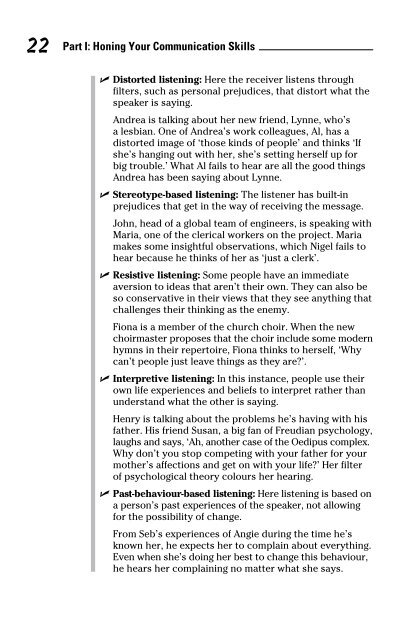348569856
Create successful ePaper yourself
Turn your PDF publications into a flip-book with our unique Google optimized e-Paper software.
22<br />
Part I: Honing Your Communication Skills<br />
✓ Distorted listening: Here the receiver listens through<br />
filters, such as personal prejudices, that distort what the<br />
speaker is saying.<br />
Andrea is talking about her new friend, Lynne, who’s<br />
a lesbian. One of Andrea’s work colleagues, Al, has a<br />
distorted image of ‘those kinds of people’ and thinks ‘If<br />
she’s hanging out with her, she’s setting herself up for<br />
big trouble.’ What Al fails to hear are all the good things<br />
Andrea has been saying about Lynne.<br />
✓ Stereotype-based listening: The listener has built-in<br />
prejudices that get in the way of receiving the message.<br />
John, head of a global team of engineers, is speaking with<br />
Maria, one of the clerical workers on the project. Maria<br />
makes some insightful observations, which Nigel fails to<br />
hear because he thinks of her as ‘just a clerk’.<br />
✓ Resistive listening: Some people have an immediate<br />
aversion to ideas that aren’t their own. They can also be<br />
so conservative in their views that they see anything that<br />
challenges their thinking as the enemy.<br />
Fiona is a member of the church choir. When the new<br />
choirmaster proposes that the choir include some modern<br />
hymns in their repertoire, Fiona thinks to herself, ‘Why<br />
can’t people just leave things as they are?’.<br />
✓ Interpretive listening: In this instance, people use their<br />
own life experiences and beliefs to interpret rather than<br />
understand what the other is saying.<br />
Henry is talking about the problems he’s having with his<br />
father. His friend Susan, a big fan of Freudian psychology,<br />
laughs and says, ‘Ah, another case of the Oedipus complex.<br />
Why don’t you stop competing with your father for your<br />
mother’s affections and get on with your life?’ Her filter<br />
of psychological theory colours her hearing.<br />
✓ Past-behaviour-based listening: Here listening is based on<br />
a person’s past experiences of the speaker, not allowing<br />
for the possibility of change.<br />
From Seb’s experiences of Angie during the time he’s<br />
known her, he expects her to complain about everything.<br />
Even when she’s doing her best to change this behaviour,<br />
he hears her complaining no matter what she says.










![Genki - An Integrated Course in Elementary Japanese II [Second Edition] (2011), WITH PDF BOOKMARKS!](https://img.yumpu.com/58322134/1/180x260/genki-an-integrated-course-in-elementary-japanese-ii-second-edition-2011-with-pdf-bookmarks.jpg?quality=85)
![Genki - An Integrated Course in Elementary Japanese I [Second Edition] (2011), WITH PDF BOOKMARKS!](https://img.yumpu.com/58322120/1/182x260/genki-an-integrated-course-in-elementary-japanese-i-second-edition-2011-with-pdf-bookmarks.jpg?quality=85)




